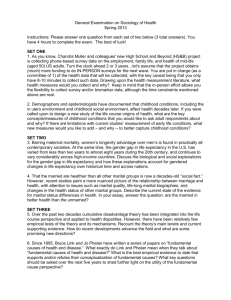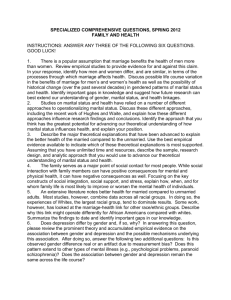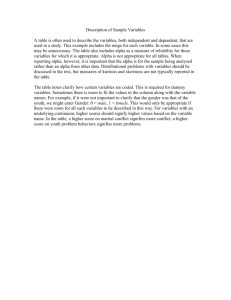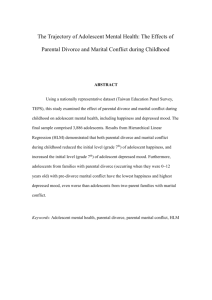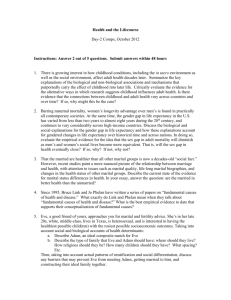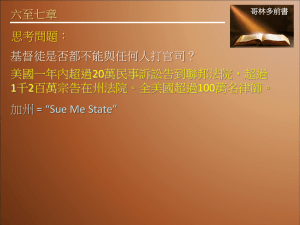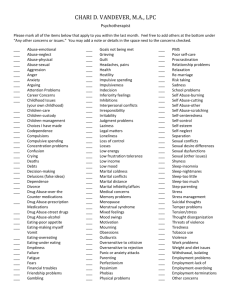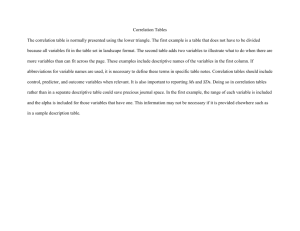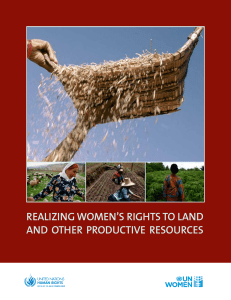This submission addresses the role of rural women in the protection
advertisement
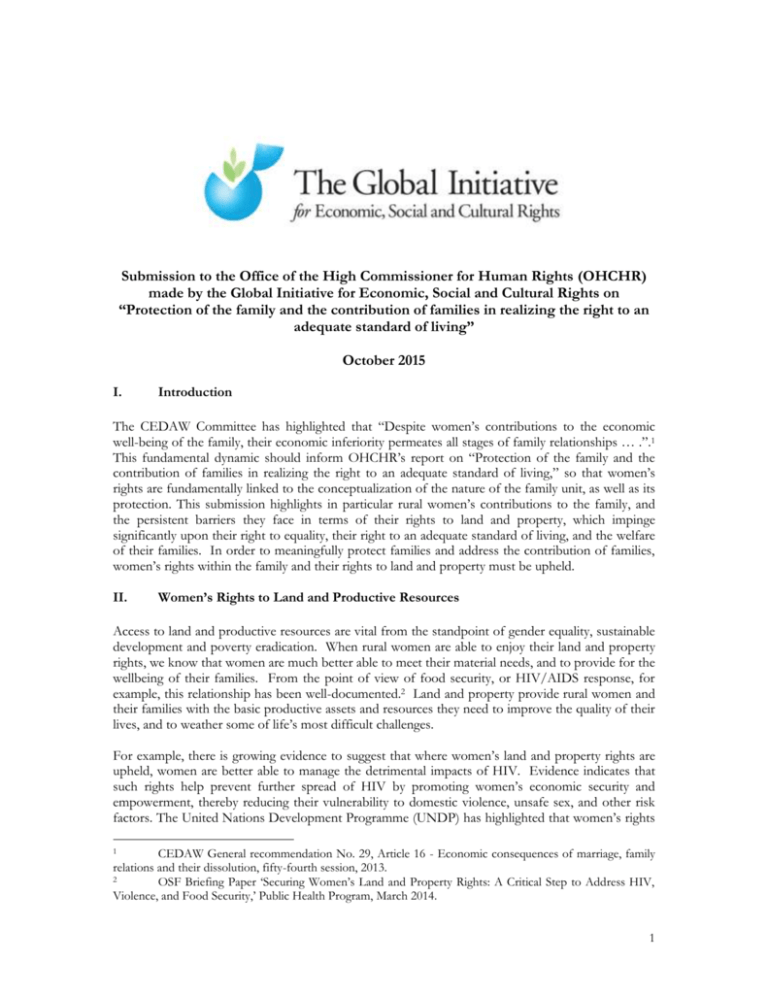
Submission to the Office of the High Commissioner for Human Rights (OHCHR) made by the Global Initiative for Economic, Social and Cultural Rights on “Protection of the family and the contribution of families in realizing the right to an adequate standard of living” October 2015 I. Introduction The CEDAW Committee has highlighted that “Despite women’s contributions to the economic well-being of the family, their economic inferiority permeates all stages of family relationships … .”.1 This fundamental dynamic should inform OHCHR’s report on “Protection of the family and the contribution of families in realizing the right to an adequate standard of living,” so that women’s rights are fundamentally linked to the conceptualization of the nature of the family unit, as well as its protection. This submission highlights in particular rural women’s contributions to the family, and the persistent barriers they face in terms of their rights to land and property, which impinge significantly upon their right to equality, their right to an adequate standard of living, and the welfare of their families. In order to meaningfully protect families and address the contribution of families, women’s rights within the family and their rights to land and property must be upheld. II. Women’s Rights to Land and Productive Resources Access to land and productive resources are vital from the standpoint of gender equality, sustainable development and poverty eradication. When rural women are able to enjoy their land and property rights, we know that women are much better able to meet their material needs, and to provide for the wellbeing of their families. From the point of view of food security, or HIV/AIDS response, for example, this relationship has been well-documented.2 Land and property provide rural women and their families with the basic productive assets and resources they need to improve the quality of their lives, and to weather some of life’s most difficult challenges. For example, there is growing evidence to suggest that where women’s land and property rights are upheld, women are better able to manage the detrimental impacts of HIV. Evidence indicates that such rights help prevent further spread of HIV by promoting women’s economic security and empowerment, thereby reducing their vulnerability to domestic violence, unsafe sex, and other risk factors. The United Nations Development Programme (UNDP) has highlighted that women’s rights CEDAW General recommendation No. 29, Article 16 - Economic consequences of marriage, family relations and their dissolution, fifty-fourth session, 2013. 2 OSF Briefing Paper ‘Securing Women’s Land and Property Rights: A Critical Step to Address HIV, Violence, and Food Security,’ Public Health Program, March 2014. 1 1 to inheritance and property are “… a crucial factor in reducing women’s vulnerability to violence and HIV … .”3 In addition, the United Nations Special Rapporteur on Violence against Women has recognized the intimate links between land and property rights and violence against women, calling upon States to ensure non-discrimination and equality in land and housing for women, so that they are able to increase their social status and not be forced into or to stay in situations of abuse, violence and exploitation.4 Studies show that women who have rights over land and housing, independent from those of their husbands or fathers, are more respected in the community, avoid situations of violence and are better able to improve their own lives as well as those of their children. 5 Further, the emerging debate around food security, particularly in light of the global food crisis, has also brought women’s land and property rights to the fore. The UN Human Rights Council Advisory Committee on discrimination in the context of the right to food found that “the right to control, have access to and manage land is tied to a woman’s right to exercise financial independence, earn a livelihood and subsequently provide a livelihood for herself and her household.”6 FAO estimates that if women had the same access to productive resources as men, they could increase yields on their farms by 20–30 percent, contributing significantly to sustainable development, poverty eradication and the economic welfare of families everywhere.7 Land and property rights for rural women also go beyond instrumentality in terms of combating poverty. It must be underscored that the advancement of these rights, in particular for women, has the power to bring about transformational change in terms of gender equality. Advancing women’s land and property rights has the power to fundamentally transform gender power dynamics both within the family and within the community. In other words, advancement of these rights advances the goal of gender equality itself, and for this reason it is important to highlight them in discussions about the protection of the family. III. Marital Power The granting of marital power to one spouse over property is a provision in some civil and customary legal systems which runs deeply counter to the right of gender equality. Marital power assumes that husbands are the ‘heads of the households,’ or legal representatives of households, with the authority to make decisions on behalf of the couple or family without the consent of their spouse/s, including exclusive rights to administration of property. In practice, the application of ‘head of the household’ provisions undermine women’s equal rights to land, housing and property, and titling programs have tended to prefer recognition of men’s rights exclusively. As FAO has recognized “… while land reform programmes adopting the household as the beneficiary unit and issuing land titles to the (male) household head may still provide female household members with access to land, they may undermine their bargaining power – and thus their UNDP, ‘Voices and Visions: The Asia Pacific Court of Women on HIV, Inheritance and Property Rights,’ 2008. 4 Report of the UN Special Rapporteur on Violence against Women, ‘Integration of the Human Rights of Women and the Gender Perspective,’ UN Doc. E/CN.4/2000/68, 29 Feb. 2000. 5 Richard S. Strickland, ‘To Have and To Hold: Women’s Property and Inheritance Rights in the Context of HIV/AIDS in Sub-Saharan Africa,’ International Center for Research on Women (ICRW) Working Paper, June 2004. 6 Study of the Human Rights Council Advisory Committee on discrimination in the context of the right to food, UN Doc. A/HRC/16/40, 16 Feb. 2011. 7 United Nations Food and Agriculture Organization (FAO), The State of Food and Agriculture: 2010-2011, 2011. 3 2 social position.”8 Scholars have similarly found that “[o]nly people deemed to be household heads nearly always men - are granted land. In effect, male household heads may be confirmed as a new class of small landowning farmers.”9 In order to effectively realize women’s rights to land and property, OHCHR and UN-Women have advocated that laws, policies and programs should “abolish the notion of marital power” and “abolish the concept of ‘head of household’ in legal designations and entitlements where it’s application would result in de facto discrimination against women, including the provision or allocation of land and other productive resources in favor of male ‘head of households.’”10 IV. Marital Property Rights and Women’s Inheritance Rights Martial property rights are another key issue: countries may apply very different default approaches to marital property, ranging from “full separation of property,” to “partial or limited community of property,” to “full community of property.” The CEDAW Committee’s General Recommendation 29 on the economic consequences of marriage is an important standard to reference, and recognizes that “Property distribution and post-dissolution maintenance regimes often favour husbands regardless of whether laws appear neutral, owing to gendered assumptions relating to the classification of marital property subject to division, insufficient recognition of non-financial contributions, women’s lack of legal capacity to manage property and gendered family roles.”11 It is in particular important for States to recognize the value of indirect, including non-financial contributions to marriage and to the acquisition of marital property. Women’s property rights in divorce situations are a critical issue for women because divorce is often a precursor to deepened poverty for women, and unequal rights in cases of divorce also present a very real barrier to women leaving abusive relationships. This reality has caused some human rights organizations to observe that in some countries, divorce can be tantamount to destitution for women.12 Progressive default marital property system must go hand in hand with the dissolution of the notion of marital power. The most favorable marital property framework would: 1) establish full community of property as the default property regime, 2) ensure that joint administration of marital property is mandated and accompanied by strong consent requirements, and 3) recognize unions other than civil marriages, and extend to these unions the same protections when it comes to property.13 Finally, inheritance has emerged as a key issue in the struggle for women’s land and property rights. It is an issue closely related to that of martial property rights, as discussed above, yet is also conceptually distinct from it. Inheritance is an important issue because it is so fundamental to the way in which wealth is transferred within a family, a society, as well as between generations. For many women, however, law and/or custom too often preclude their being able to benefit from inheritance practices on an equal footing – if at all – which make them and their families completely unable to tap into the economic benefits and security that inheritance can bring. Lorenzo Cotula, ‘Gender and Law - Women’s Rights in Agriculture,’ FAO Legal Office, 2002. Susie Jacobs, ‘Land Reform: Still a Goal Worth Pursuing for Rural Women?,’ Journal of International Development, Vol. 14, 2002, pp. 887-898. 10 UN-Women/OHCHR, ‘Realizing women’s rights to land and other productive resources,’ 2013, p 36. 11 CEDAW General recommendation No. 29, Article 16 - Economic consequences of marriage, family relations and their dissolution, fifty-fourth session, 2013. 12 See: Human Rights Watch, ‘Divorced from Justice: Women’s Unequal Access to Divorce in Egypt,’ December 2004. 13 IRCW (Document prepared by Anna Knox, Noni Milici and Nata Duvvury), ‘Connecting Rights to Reality: A Progressive Framework of Core Legal Protections for Women’s Property Rights,’ 2007. 8 9 3
